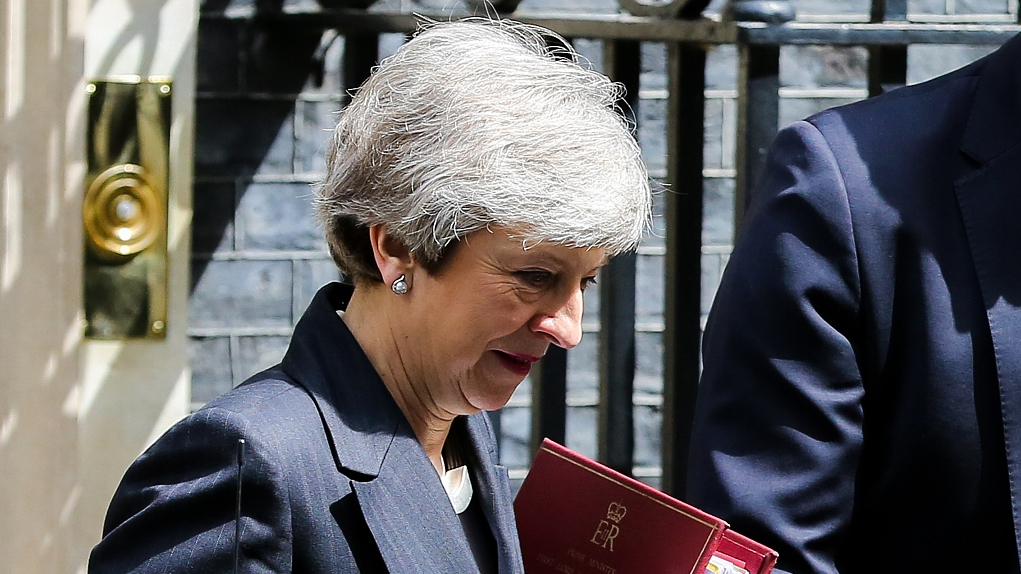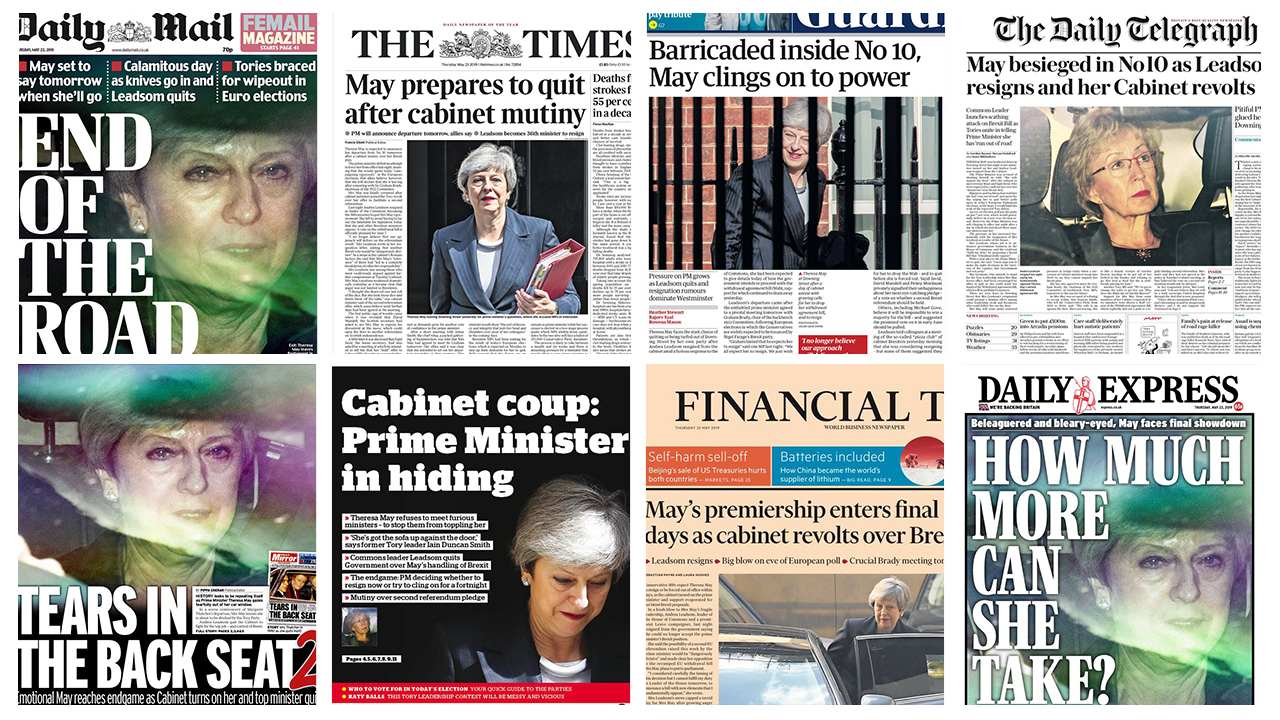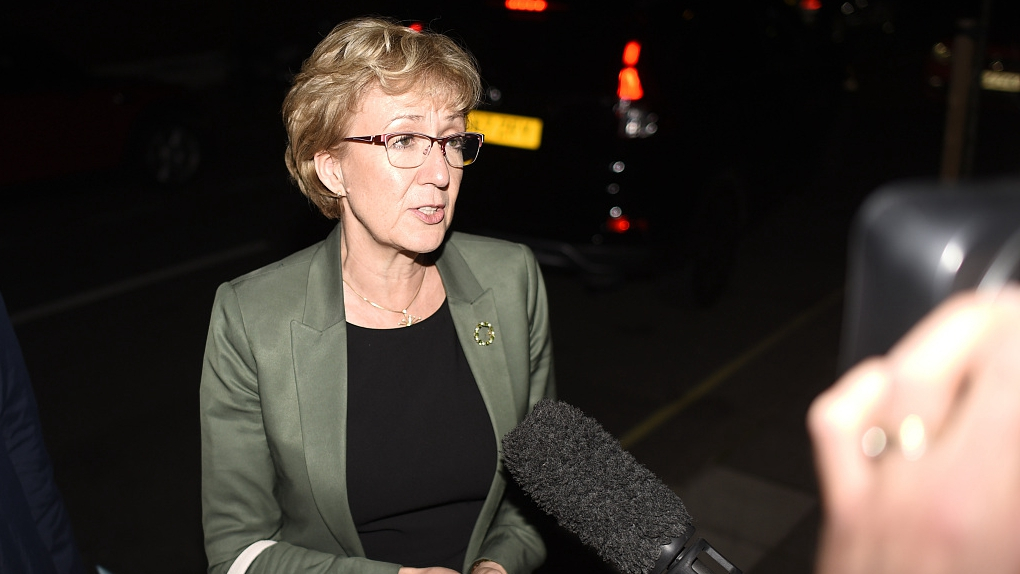
Europe
12:49, 23-May-2019
Kick-the-can British PM May looks to have run out of road
By John Goodrich

The end of Theresa May's premiership looks to be fast-approaching.
The British prime minister has battled back from seemingly impossible situations during her Brexit-dominated time in Downing Street, but a combination of factors have come to a head this month that put her on the brink of exit.

CGTN Compilation
CGTN Compilation
May was always likely to be a tricky month for the prime minister.
First, her Conservatives were trounced in local elections, losing more than 1,300 seats – the party's worst result in over two decades.
Then, cross-party talks – which offered a glimmer of hope of passing a Brexit deal through parliament – collapsed.
Next, May's "bold" bid to put Brexit legislation – the Withdrawal Agreement Bill (WAB) – to parliament was panned by members of her government as well as the wider party and opposition.
On Wednesday evening one Cabinet minister (and leadership rival), Andrea Leadsom, resigned – the 36th minister to quit May's government – and others are reported to have voiced opposition in private.
In her resignation letter, Leadsom – who would have had to introduce the WAB to parliament in her role as Leader of the House of Commons – wrote: "I no longer believe that our approach will deliver on the referendum result."
The prime minister has been urged not to put the withdrawal legislation to a vote, currently scheduled for the first week in June. It contains elements – such as the possibility of a second referendum – that many in her party can't support, and the opposition has little reason to back it. It is all but certain to be defeated, the fourth loss on a meaningful Brexit vote.

Former Leader of the House of Commons, Andrea Leadsom, arrives at her London home after announcing her resignation from government, May 22, 2019. /VCG Photo
Former Leader of the House of Commons, Andrea Leadsom, arrives at her London home after announcing her resignation from government, May 22, 2019. /VCG Photo
On Wednesday, May refused to hold meetings with senior ministers. On Thursday, a potential replacement, Foreign Secretary Jeremy Hunt, is expected to hold talks with her, while Sir Graham Brady, chairman of the 1922 Committee, is likely to have an audience with the prime minister on Friday.
The 1922 Committee – the parliamentary group of Conservative MPs – is reported to have voted on Wednesday in a secret ballot on a rules change which would allow an immediate no-confidence vote in May. If she refuses to resign, that vote could well take place very soon.
In the background, the latest YouGov poll suggests her party – the governing party – could slump to just seven percent in today's European Parliament elections.
The circumstances are unique given Brexit uncertainty, but to finish fifth in a national election would be extraordinary for one of the world's oldest political parties. The results of those elections aren't expected before late Sunday evening.

Boris Johnson delivers a speech at JCB World Headquarters in Staffordshire, January 18, 2019. /VCG Photo
Boris Johnson delivers a speech at JCB World Headquarters in Staffordshire, January 18, 2019. /VCG Photo
If May does resign in the coming days, she would remain as prime minister while a leadership contest takes place over a period of up to six weeks. Her replacement would be selected in a two-stage process, first by Conservative MPs and then by party members.
An array of contenders has lined up to take the job, with surveys suggesting former foreign secretary Boris Johnson is the favorite among the membership. Whether he, or other hardline Brexiteers, would be able to form a government – the Conservatives already govern as a minority, and some MPs have said they would quit the party if Johnson became the leader – is one of many uncertainties to come.
May has bounced back before, but there appear to be no options left. A prime minister who has survived by repeatedly kicking the can down the road looks finally to have come to the end.

SITEMAP
Copyright © 2018 CGTN. Beijing ICP prepared NO.16065310-3
Copyright © 2018 CGTN. Beijing ICP prepared NO.16065310-3